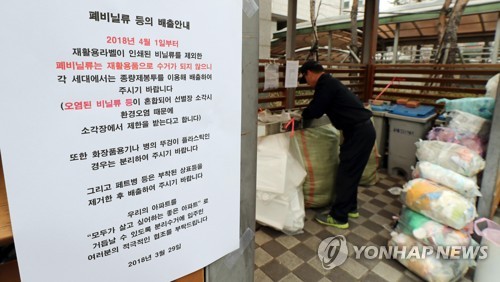- California Assembly OKs highest minimum wage in nation
- S. Korea unveils first graphic cigarette warnings
- US joins with South Korea, Japan in bid to deter North Korea
- LPGA golfer Chun In-gee finally back in action
- S. Korea won’t be top seed in final World Cup qualification round
- US men’s soccer misses 2nd straight Olympics
- US back on track in qualifying with 4-0 win over Guatemala
- High-intensity workout injuries spawn cottage industry
- CDC expands range of Zika mosquitoes into parts of Northeast
- Who knew? ‘The Walking Dead’ is helping families connect
S. Korea struggling to reduce plastic waste amid China’s import ban
By Hwang Doo-hyong
SEOUL, April 4 (Yonhap) — South Korea is struggling to reduce the use of plastic bags and containers and develop alternatives as China announced it will halt the import of plastic waste products, observers here said Wednesday.
Garbage pickup services recently stopped collecting plastic bags and Styrofoam containers, citing a spike in processing costs. The value of waste resources has crashed in the wake of China’s ban on the importation of plastic waste starting from January. This development is making it hard for local collectors to turn a profit.
The Ministry of Environment arranged an emergency meeting Tuesday with waste management companies and the Seoul Metropolitan Government and other provincial administrations to ensure plastic waste is properly collected.
The ministry said it will soon come up with measures to help waste service businesses make money for services offered so they can stay afloat during challenging times.
 A notice announcing waste removal companies’ decision not to collect plastic waste is posted on the wall of a garbage disposal area in an apartment complex in Yongsan, central Seoul, on April 1, 2018. (Yonhap)
A notice announcing waste removal companies’ decision not to collect plastic waste is posted on the wall of a garbage disposal area in an apartment complex in Yongsan, central Seoul, on April 1, 2018. (Yonhap)
South Korea’s retailers are joining efforts by the government to reduce plastic waste.
Emart Inc., South Korea’s biggest discount store chain and an affiliate of Shinsegae Group, said it has been operating outlets with no plastic bags since 2009.
Emart and other major retailers signed an agreement with the Ministry of Environment in 2010 to quit distributing plastic bags at their malls, while super supermarkets (SSMs) also joined the campaign in 2012.
They instead distribute paper bags and discarded boxes to help customers pack their goods.
Reflecting this trend, Lotteria Co., the operating unit of local hamburger chain Lotteria and Angel-in-us Coffee cafes, offers discounts to clients who use mugs or tumblers instead of disposable cups.
Cosmetics maker Amorepacific; CJ Cheiljedang Corp., South Korea’s leading food manufacturer; and several other firms have been using paper boxes and trying to develop boxes and containers using environment-friendly materials.
Manufacturers of garments and Korean hot instant noodles, or “ramyeon,” however, find it difficult to reduce the use of plastic due to the nature of their industries.
“We are trying to develop alternatives to plastic packaging,” an official of ramyeon manufacturer Nongshim said. “However, this process is not easy since plastic is well suited for packaging the easy to prepare food.”
This view was echoed by local garment makers, who said at the moment there are no other materials that can take the place of plastic.

South Korean retailers, meanwhile, are estimated to have reduced the use of plastic by about 150 million bags over the years as they have tried to do their part to better preserve the environment, according to industry sources.
The country has, moreover, joined a broader international effort to reduce the use the plastic. The United States, Britain, Germany and scores of other countries actually designated July 3 as a day to do away with plastic bags.
The Korea Zero Waste Movement Network, a nongovernmental organization working to help solve waste problems caused by urbanization, said South Korea produces 23 million tons of carbon dioxide every year with the use of plastic bags, which account for about 80 percent of the waste being dumped into the ocean.
It pointed out that in 2015 each South Korean used 420 plastic bags on a yearly basis, much more than four for Finland, 20 for Ireland, 70 for Germany, 120 for Spain and 250 for Greece, the network said. The organization added that the number of plastic bags used in South Korea has risen to 21.6 million in 2015 from 12.5 billion in 2003, 14.7 billion in 2008 and 19.1 billion in 2013.
Excessive packaging has also contributed to the use of plastic bags.
“We reckon the problem to be linked to the distribution industry packing goods in an excessive manner,” a market watcher said. “The reality, however, is that there are no viable alternatives unless everyone starts to use less plastic.”
Up until the development of a new form of eco-friendly packaging, the government may need to legislate the levying of taxes on the manufacturers and users of products using plastic to drastically reduce the use of the products causing environmental problems, another source warned.
















